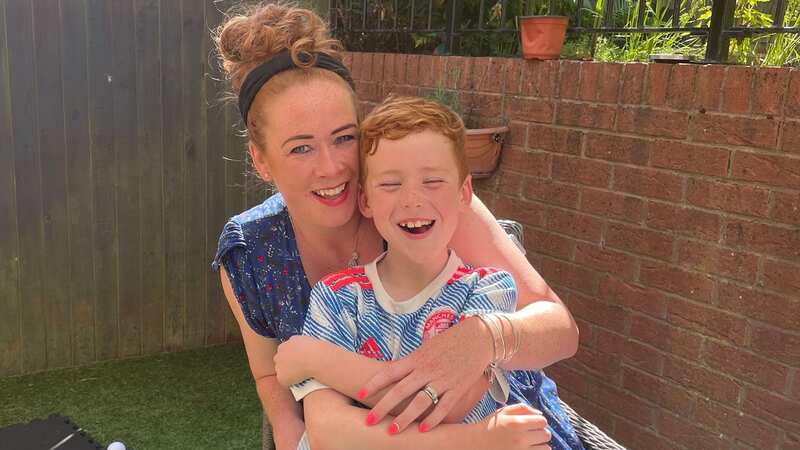'I went to bed as normal - then woke up from a coma in hospital six weeks later'
When Jody Foster went to bed as normal – and woke up in hospital from a coma six weeks later, she initially felt relief. The medics who greeted her as she opened her eyes, 20 years ago, revealed she had type-1 diabetes.
After feeling unwell for almost a year, and repeatedly visiting her GP, she finally had an answer. Jody, 44, says: “Little did I know how much my life would change from that minute on.”
In the preceding months, Jody had lost weight, often felt low and fatigued and her sight was sometimes blurry – all common symptoms of diabetes. But rather than receive a proper diagnosis, she was told she had an eating disorder, despite the fact she ate normally and was not trying to lose weight. She was diagnosed with anxiety and given medication, which she didn’t take.
When she returned to the surgery to say she was often thirsty she was told it was a side effect of the anti-anxiety drug, which she wasn’t taking. “This went on for some time. Sometimes my speech was slurred and I was forgetting everything. It got to the point where I thought, ‘Am I going crazy?’”
As well as studying psychology at Leeds University she worked part time and was even called in for a meeting with her manager, who had suspected Jody’s slurred speech and tiredness were due to alcohol.
 Teachers, civil servants and train drivers walk out in biggest strike in decade
Teachers, civil servants and train drivers walk out in biggest strike in decade
None of the doctors she saw carried out the routine urine test, which would have revealed Jody had type-1 diabetes, probably triggered by an infection the year before. Instead, she became so ill she moved back to live with her parents. It was a decision that probably saved her life because it was on her first night home that she slipped into a diabetic coma and spent the next six weeks in intensive care.
When she woke up on the diabetes ward and a nurse explained what had happened, Jody says: “I thought, ‘I can handle that’. At least they know I haven’t got an eating disorder and I’m not going crazy.”
She was prescribed insulin and told how to inject herself, but it was a year before she saw a diabetes specialist. Having learned first-hand how hard it can be to control blood sugar levels, Jody changed her career plans, starting a nursing degree and qualifying as a specialist diabetes nurse.
 Jody uses a system that mimics the pancreas (Getty Images)
Jody uses a system that mimics the pancreas (Getty Images)Even with this specialist knowledge, Jody struggled to manage her own blood sugar. “Every day was a challenge,” she admits, and appointments with her consultant were an “annual telling off”.
“One even asked ‘Do you want to be dead by the time you’re 40?’ What a stupid question.”
Jody, who lives in Manchester with husband Paul and son Ralph, nine, says: “You can’t unhear things like that.”
People with diabetes are acutely aware of the complications that can flow from poor blood sugar control. Persistently high blood sugar causes nerve and vascular damage which can lead to blindness, cardiovascular and kidney disease, nerve damage and amputations. But Jody says the psychological impact is often underestimated.
In the first few years after her diagnosis, when she went out with friends, Jody would duck to the toilets to do a finger-prick test before allowing herself a glass of wine. Some days she’d try to ignore her diabetes, and wake up feeling unwell.
During her pregnancy, her levels became even harder to control. “It’s completely out of your hands,” she explains. “One morning I could have a small bowl of cereal and need five units of insulin, within two weeks I was needing 200 units after the same bowl of cereal.”
There was constant anxiety, fearing high blood sugar would harm her baby. “You want to enjoy your pregnancy but you can’t,” she says. At 28 weeks, Jody’s levels became dangerously high and Ralph was born by emergency caesarean section. His twin did not survive.
 Greggs, Costa & Pret coffees have 'huge differences in caffeine', says report
Greggs, Costa & Pret coffees have 'huge differences in caffeine', says report
As soon as he could speak, Ralph was shown how to use a telephone in case his mother had a hypo – when her blood sugar levels drop too low, which could cause her to collapse – and he had to call an ambulance.
Recently he noticed another child at school was often thirsty and going to the toilet a lot and he asked: “Could they have diabetes?” They were diagnosed within a fortnight. “I can’t tell you how amazing Ralph is,” Jody says with pride.
Those fears have receded as Jody’s blood sugars are now well controlled, thanks to a hybrid closed-loop system that is essentially an artificial pancreas in her pocket. She uses a system by healthcare firm Abbott and partners, one of several that mimic how the pancreas works. It uses a small skin sensor to monitor glucose levels, and this is paired with an algorithm on her mobile phone which calculates if insulin is needed. This activates a tiny pump in a pocket that Jody wears under her clothing which then releases the correct dose of insulin.
These systems, which provide far better glucose control than single insulin injections before a meal, have been available on the NHS since 2022 for a small number of eligible people.
Jody, who now works for Abbott in an educational role, was one of the first to use one. Now the National Institute for Health and Care Excellence has ruled these systems should be made available to a wider group of patients, including all children and young people, women who are pregnant or planning a pregnancy, patients who are struggling with low levels and those already using insulin pumps.
Across the UK there are 480,000 people living with type-1 and in England alone, it is thought 100,000 people will benefit from the five-year plan to roll out these life-changing devices.
Jody adds: “People say, ‘You control diabetes, it shouldn’t control you’. But that is easier said than done. But now, this past year or so, I’m more in control because of the system I’m on.”
Read more similar news:
Comments:
comments powered by Disqus


































